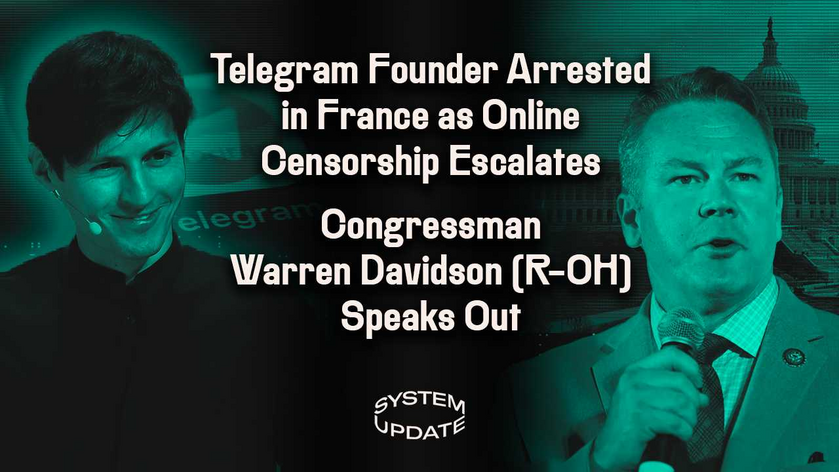Watch the full episode HERE
Good evening. It's Monday, August 26.
Tonight, I am not in our normal studio. I am traveling due to some reporting, but I think we can make do. We should have a studio for the rest of the week. We have, I think, an extremely important story to dissect and analyze, and that is that the billionaire founder of the encrypted app Telegram, Pavel Durov, was arrested over the weekend by the French national police when his private jet landed in an airport just outside of Paris. French authorities have now confirmed that he is in detention, specifically because the prosecutors have created a theory that the creator, founder, and CEO of Telegram, which is intended to be an encrypted app designed to safeguard the privacy of its users, has become, quote, “criminally complicit” as a result, not of anything that the founders of Telegram are doing or that its executives are doing, but that other people unknown to Telegram, are doing on the platform and by failing to shut down channels, at the demand of the French government. This is a major escalation of the war against any sort of attempt to preserve internet freedom.
If you stop to think about it, this has been a theory that has long been bubbling, the idea that if leaders or owners or managers or executives of various platforms don't censor information the government instructs them to censor that becomes a criminal felony. The only actual example of any previous social manager executive being actually arrested for failing to turn over information to or censor on behalf of the government was back in 2016 when Brazil arrested a Facebook official as a result of Facebook's refusal, which they said was due to their inability, to turn over certain end to end encrypted content on WhatsApp. But this latest one is a massive escalation of the attack on online free speech by trying now to consecrate the legal principle that any owner of a platform – the founder, the CEO, or any of the top executives – becomes criminally liable, complicit in criminal activity, whether it's proliferating hate speech or disinformation or trafficking and child pornography or anything else that the platform can be accused of as a result of not complying with government orders. This is clearly yet another attempt, often led by Western Europe or Brazil or Canada, with the United States trying to find a way to copy and follow and to get around the First Amendment, and so we will analyze this entire case and its implications for online free speech.
Then, we will speak to Congressman Warren Davidson, who is a Republican representing Iowa, Ohio's 8th Congressional District. He has represented that seat since 2016. Congressman Davidson has used his place in Congress and his increasing seniority to make front and center of the cause of online free speech, one of his principal focal points. He was one of the few Republicans to denounce the ban on TikTok. We'll talk to him about the Durov incident and the ban on TikTok, but we'll also talk to him about the still increasing dangers of the war in Ukraine, not only with the incursion of Ukrainian troops back with U.S. weapons into Russian soil, where they continue to remain dug in, trying to occupy parts of Russia with the permission of the United States and the weapons that we're providing but also the collapsing front line in Ukraine, where Russia continues to make broader incursions to the west. We'll talk to him about what the U.S. endgame is, whether we're just going to continue to fund this futile, but still very dangerous war to the end.
For now, welcome to a new episode of System Update, starting right now.






















